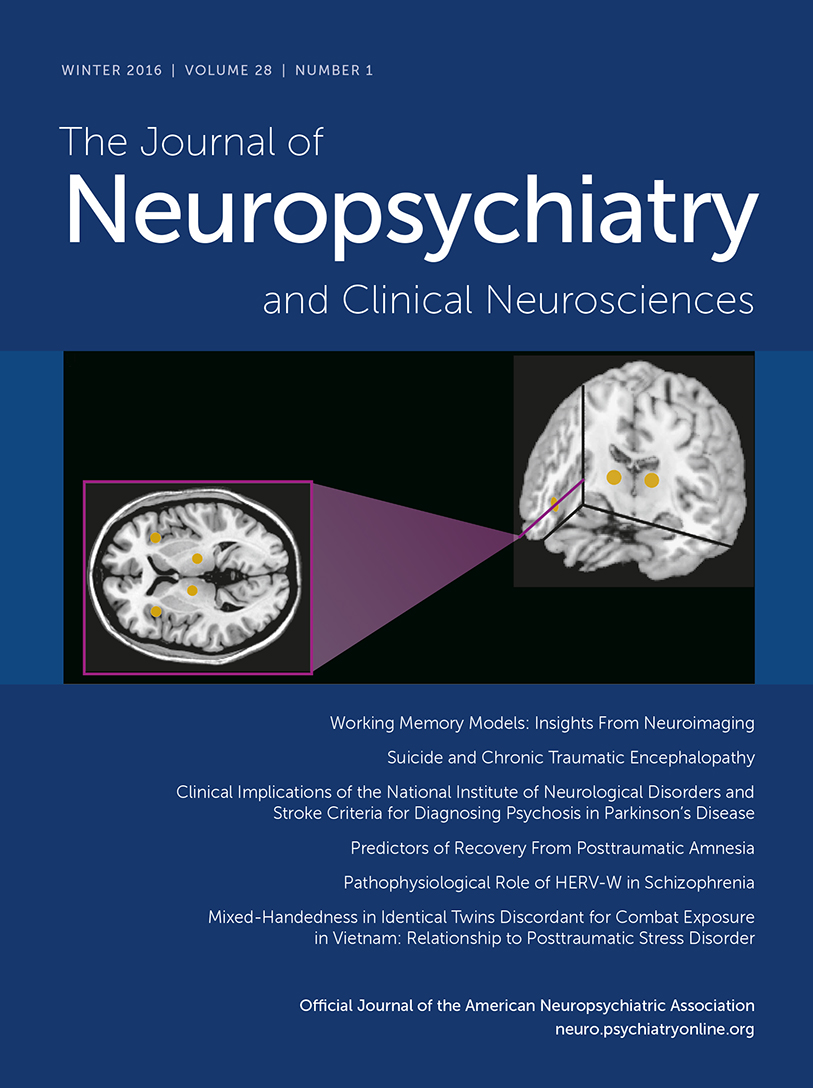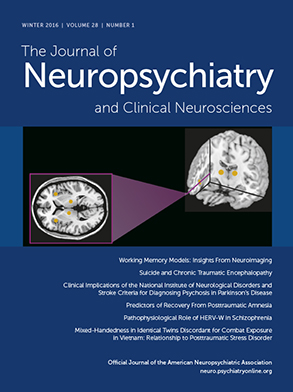To the Editor: Hypothyroidism is a common hormone deficiency, associated with multiple causes and presenting with diverse clinical manifestations including neuropsychiatric disease. Hypothyroidism is commonly associated with depressive symptoms, and thyroid hormone screening is indicated in patients with a history of depression. Although other neuropsychiatric disorders could be induced by hypothyroidism, only 14 reports present clinical cases of mania related with this hormone deficiency.
1,2 Autoimmune thyroiditis is the most frequent reported cause of hypothyroidism associated with acute mania. Here we present a clinical case of acute mania in a 36-year-old man with hypothyroidism resulting from thyroidectomy in the context of papillary thyroid carcinoma.
Case Report
A 36-year-old man with no past or family history of psychiatric illness was brought to the psychiatric emergency room for disruptive behavior associated with auditory and visual hallucinations and mystic delusions. He wore a blindfold over his eyes and a large cross at his neck, believing that anyone who looked at his eyes would become blind. According to his family, symptoms began suddenly 2 days before arrival to the hospital. On examination, he was conscious and his orientation was intact. He manifested high distractibility, elevated and expansive mood, pressure of speech, flight of ideas, experiences of self-reference, and mystic delusions. Physical examination revealed myxedema. Results on physical and neurological examinations were otherwise normal.
He had a previous history of papillary thyroid carcinoma and had undergone thyroidectomy and radioactive iodine therapy 4 months before arrival to the hospital. After surgery, he started taking levothyroxine for 2 months but had stopped 2 months before arrival to the hospital because he misunderstood the information.
Initial laboratory assessment (including complete blood count, electrolytes, and renal and liver function) was within normal values. Results on urine drug screen test were negative, and blood ethanol levels were undetectable. Electrocardiogram results were normal, and results on brain CT scan did not demonstrate any pathology. His free levothyroxine (fT4) level was low at 0.55 ng/dL (0.76–1.46 ng/dL), and his thyroid-stimulating hormone (TSH) level was elevated at 98.1 uIU/mL (0.36–3.74 uIU/mL). Thyroid peroxidase and thyroglobulin antibodies titer results were negative. Prolactin level was within normal range.
After the initial evaluation, a diagnosis of acute mania was established and he was admitted to the Hospital de Braga’s Psychiatry Unit. The patient was medicated with olanzapine 15 mg/day and lorazepam 5 mg/day to treat his psychotic mania and was prescribed levothyroxine 100 µg/day to treat his hypothyroidism. His manic symptoms improved rapidly, and he was discharged from the hospital 2 weeks later in a clinically stable condition and demonstrated improvements in serum levels of fT4 (0.70 ng/dL) and TSH (82.7 uIU/mL).
After the patient was discharged, olanzapine was progressively reduced until complete discontinuation at 6 months. With levothyroxine maintenance therapy, thyroid function returned to normal levels (fT4: 0.82 ng/dL, TSH: 0.55 uIU/mL). Despite taking no psychotropic medication, the patient showed no psychiatric symptoms after a 2-year follow-up.
Discussion
The association between thyroid disorders and affective disorders has been well documented for more than a century. Typically, hypothyroidism is associated with depression and hyperthyroidism with mania. The occurrence of mania in hypothyroid states is rare, and only a few cases of mania associated with hypothyroidism have been reported in the literature. Characteristically, these patients were women (12 of 14) and had no previous psychiatric history (9 of 14), and autoimmune thyroiditis was identified as the likely cause of hypothyroidism in most cases.
1,2Our patient reported here manifested unusual features of acute mania associated with hypothyroidism: the patient was male, the hypothyroidism resulted from a thyroidectomy due to a papillary thyroid carcinoma, and there was no history of autoimmune thyroiditis. These facts highlight the importance of determining whether the mania displayed in our patient was a primary psychiatric disorder or secondary to documented hypothyroidism.
First, our patient had no previous personal or family history of mental illness, alcohol use, and/or drug abuse. Second, he had an atypical age for the onset of bipolar mania: bipolar disorder has a mean age of onset of 22 years, and symptoms may occur even earlier.
3 Third, he had visual hallucinations—an uncommon symptom in bipolar mania.
4 Fourth, his psychotic symptoms improved rapidly after antipsychotic treatment and levothyroxine supplementation for 2 weeks. Finally, he had neither recurrence of mania nor episodes of depression or psychosis during the 2-year follow-up without any psychiatric medication. Altogether, these facts support the diagnosis of a psychotic mania secondary to hypothyroidism.
Brain mechanisms involved in acute mania associated with hypothyroidism are unknown. However, several hypotheses have been postulated, including increased tyrosine hydroxylase activity with subsequent increased cerebral dopamine levels, increased catecholamine activity induced by higher sensitivity of beta adrenergic receptors, disruption of circadian rhythms, and direct action of thyroid peroxidase antibodies.
1 The lack of sleep disturbances before mania onset and the absence of antithyroid and antithyroglobulin antibodies in our patient make the latter two mechanisms less likely to explain his psychotic mania.
The psychiatric manifestations of hypothyroidism are very diverse and include cognitive, affective, and psychotic symptoms. Despite being a rare presentation of hypothyroidism, patients who manifest atypical mania should be screened for thyroid disease for prompt recognition and management of possible underlying endocrinological pathology.

